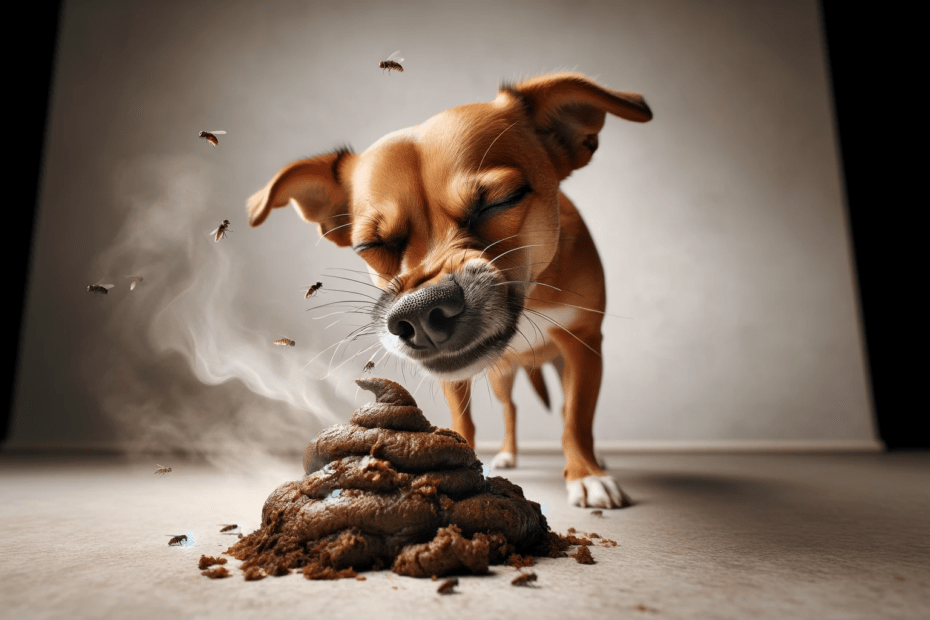In the fascinating world of canine behavior, one peculiar habit that often raises eyebrows is why dogs engage in the act of smelling their own feces. This behavior, though seemingly unappealing to us humans, serves a crucial purpose in the intricate world of a dog’s olfactory system.
By delving into the scientific and evolutionary aspects of this behavior, this article aims to shed light on the reasons behind why dogs exhibit this seemingly peculiar habit and the significance it holds in their overall communication and well-being.
Key Takeaways
- Dogs have a highly developed sense of smell, with 300 million olfactory receptors, allowing them to detect and differentiate a wide range of scents.
- Smelling their own poop helps dogs gather information about their health, environment, and possible signs of illness.
- Dogs use scent marking on their feces to establish territorial boundaries, communicate with other dogs, and convey information about their reproductive status and social rank.
- Smelling feces allows dogs to gather information about the health, diet, and social status of other dogs, contributing to their olfactory communication and social interactions.
The Importance of Scent for Dogs
The olfactory abilities of dogs make scent an essential aspect of their communication and perception of the world. Dogs have an incredibly sensitive sense of smell, with an estimated 300 million olfactory receptors compared to the 6 million found in humans. This remarkable sense of smell allows them to detect and differentiate a wide range of scents, enabling them to gather information from their environment and communicate with other dogs.
The importance of olfactory senses in dogs can be seen in their communication through scent. Dogs use scent marking as a way to establish territory and communicate with other dogs. By urinating or defecating in specific locations, dogs leave behind chemical signals known as pheromones. These pheromones contain information about the dog’s sex, reproductive status, and individual identity, allowing other dogs to gather information about the dog who marked the area.
Furthermore, dogs can also detect changes in the scent of other dogs, which can provide valuable information about their emotions and overall health. For example, a change in the scent of urine can indicate a urinary tract infection or other health issues. Additionally, dogs can detect fear or stress pheromones released by other dogs, which helps them understand the emotional state of their counterparts.
Evolutionary Instincts and Survival Tactics
Evolutionary instincts and survival tactics drive dogs to engage in the behavior of smelling their own poop. This behavior can be traced back to their evolutionary adaptations and the process of natural selection.
One possible explanation for this behavior is the need for dogs to gather information about their own health and the environment in which they live. By smelling their poop, dogs can detect any changes in their digestive system or signs of illness. This ability to self-monitor enables them to identify potential health issues early on, allowing them to seek medical attention if necessary.
Additionally, dogs have a highly developed sense of smell, which plays a crucial role in their survival. This keen sense of smell allows them to detect predators, prey, and other animals in their vicinity. By smelling their poop, dogs can leave behind scent markers that communicate their presence to other animals. This can help establish territorial boundaries, convey information about their health and reproductive status, and even facilitate social interactions with other dogs.
Furthermore, the behavior of smelling poop can be seen as a way for dogs to gather information about their environment. By smelling their own feces, dogs can assess the presence of other animals in the area, including potential threats or sources of food. This information helps them make informed decisions about their movements and interactions in their surroundings.
Marking Territory and Establishing Dominance
Marking territory and establishing dominance are crucial aspects of a dog’s social behavior. Through scent communication, dogs leave their unique odor on their feces, which serves as a territorial marker and helps establish their rank within a group.
This instinctual territorial behavior is deeply rooted in their evolutionary history and plays a significant role in maintaining social order and hierarchy among dogs.
Scent Communication and Hierarchy
Dogs engage in scent communication and hierarchy establishment by smelling their own feces. Scent recognition and olfactory communication play a crucial role in their social interactions. By sniffing their poop, dogs can gather important information about the individual who left the scent, such as their age, sex, and reproductive status. This allows dogs to establish dominance and mark their territory.
The scent of feces contains chemical signals known as pheromones, which are unique to each individual. These pheromones serve as a form of communication, conveying messages about the dog’s social status and territorial boundaries. By depositing their own scent through feces, dogs can establish their presence and assert their dominance over other dogs in the area.
Smelling their poop is a way for dogs to communicate and maintain their social hierarchy.
Instinctual Territorial Behavior
One important instinctual behavior in dogs is the act of marking their territory and establishing dominance through scent recognition and communication.
Territorial marking is a behavior exhibited by many animals, including dogs, to establish and defend their boundaries. Dogs have a highly developed olfactory system that allows them to detect and interpret scent messages left by other animals.
By marking their territory, dogs leave behind their unique scent, which serves as a form of communication to other dogs. This instinctual behavior helps them establish dominance and assert their presence in a particular area.
Through territorial marking, dogs are able to communicate their identity, reproductive status, and social rank to other dogs in their vicinity. This behavior is deeply ingrained in their instincts and plays a crucial role in their social interactions.
Communication With Other Dogs
Canine fecal odor serves as a potent olfactory tool for inter-dog communication. Dogs rely heavily on their sense of smell to gather information about their environment and other dogs. The act of smelling feces allows dogs to gather crucial information about the health, diet, and social status of other dogs in their vicinity.
When dogs smell each other’s feces, they are engaging in a form of olfactory communication. This communication is a vital part of their social interaction and helps them establish and maintain social bonds. By sniffing feces, dogs can detect chemical signals known as pheromones, which are released in urine and feces. These pheromones contain information about the dog’s identity, such as their age, sex, and reproductive status.
Furthermore, dogs can also gather information about the emotional state and social hierarchy of other dogs through their feces. Changes in the chemical composition of feces can indicate stress, fear, or aggression, allowing dogs to assess the potential threat posed by other individuals.
In addition to olfactory communication, dogs also rely on body language to communicate with each other. They use a combination of vocalizations, facial expressions, and body postures to convey information about their intentions, emotions, and social status. Understanding and interpreting dog body language is crucial for effective communication and can help prevent misunderstandings and conflicts between dogs.
Health Monitoring and Identification
Dogs have an exceptional sense of smell, allowing them to detect various scents, including those related to health.
They use their sense of smell to analyze the scent of their poop, which can provide valuable information about their overall well-being.
Scent Analysis for Health
Utilizing scent analysis for health monitoring and identification, dogs demonstrate their remarkable ability to detect subtle changes in bodily odors. This ability is attributed to their highly developed canine olfactory system, which is far more sensitive and sophisticated than that of humans. Dogs possess approximately 300 million olfactory receptors compared to our mere 5 million. As a result, they can detect and differentiate a wide range of smells, including those associated with various health conditions.
Scent detection in dogs has been successfully used in medical settings for the early detection of diseases such as cancer, diabetes, and even malaria. Research has shown that certain diseases can produce specific odor profiles that dogs are trained to recognize. By simply sniffing samples, dogs can accurately identify individuals with these conditions, potentially allowing for quicker diagnosis and treatment.
Poop as Diagnostic Tool
Scent analysis for health monitoring and identification incorporates fecal odor as a diagnostic tool, allowing dogs to detect subtle changes in bodily odors with their highly developed olfactory system.
Poop analysis, also known as fecal analysis, has gained recognition as a valuable medical detection method. The composition of feces can provide valuable insights into an individual’s health status, including the presence of certain diseases, infections, or dietary deficiencies.
By analyzing the scent of feces, dogs can identify specific volatile organic compounds that are indicative of underlying health conditions. This method has shown promise in the early detection of diseases such as colorectal cancer, inflammatory bowel disease, and even certain types of infections.
The ability of dogs to detect these changes in fecal odor has the potential to revolutionize medical diagnostics, offering a non-invasive and cost-effective approach to health monitoring.
Analyzing Diet and Digestive Health
Examining the relationship between a dog’s olfactory habits and its dietary choices and digestive well-being provides valuable insights into their overall health. A dog’s sense of smell is highly developed, and they use it to gather information about their surroundings, including their own waste. The act of smelling their feces serves several purposes, one of which is to analyze their diet and digestive health.
Dietary choices play a crucial role in a dog’s overall well-being. The food they consume directly affects their digestive system and the composition of their gut microbiome, which refers to the community of microorganisms residing in their intestines. A balanced and nutritious diet promotes a healthy gut microbiome, leading to efficient digestion and absorption of nutrients.
By sniffing their feces, dogs can assess the quality of their diet and the state of their digestive health. They can detect any undigested food particles or abnormalities in their stool consistency, which may indicate issues such as malabsorption or dietary intolerances. Additionally, changes in the odor of their feces can also provide insights into their gut microbiome composition and overall digestive function.
Analyzing a dog’s olfactory habits regarding their feces can therefore offer valuable information about their dietary choices and digestive well-being. This knowledge can help pet owners make informed decisions about their dog’s diet and ensure their overall health and well-being.
Behavioral Issues and Anxiety
Dogs’ olfactory investigation of their feces can provide insights into behavioral issues and anxiety. While it may seem puzzling or even disgusting to us, this behavior serves a purpose for dogs. The act of smelling their own feces is a natural instinct that can reveal important information about their health, as well as their emotional well-being.
Behavioral issues in dogs can manifest in various ways, such as aggression, excessive barking, or destructive behavior. Anxiety, on the other hand, can lead to symptoms like restlessness, excessive panting, or trembling. Dogs may engage in the behavior of smelling their feces as a coping mechanism for these issues. It can provide them with a sense of comfort or security.
In some cases, dogs may exhibit this behavior due to medical conditions. Certain medical conditions, such as gastrointestinal disorders or urinary tract infections, can cause changes in the smell or appearance of a dog’s feces. By smelling their feces, dogs may be trying to gather information about their overall health.
Addressing behavioral issues and anxiety in dogs often requires a multi-faceted approach. Behavior modification techniques, such as positive reinforcement training, can be effective in reducing unwanted behaviors. Additionally, it is crucial to rule out any underlying medical conditions that may be contributing to the behavior. Consulting with a veterinarian or a professional dog trainer can help identify the root cause and develop an appropriate treatment plan.
Training and Correcting Undesirable Behavior
How can training techniques be utilized to address and correct undesirable behavior in dogs that engage in the behavior of smelling their own feces?
Training methods, particularly those based on positive reinforcement, can play a crucial role in addressing and correcting undesirable behaviors in dogs, including the behavior of smelling their own feces. Positive reinforcement involves rewarding a desired behavior to increase the likelihood of its repetition. In the case of dogs that engage in this behavior, an effective approach would be to redirect their attention to an alternative behavior, such as sitting or staying, and rewarding them with treats or praise when they comply. This helps to shift their focus away from the undesirable behavior and encourages them to engage in more appropriate actions.
Consistency and repetition are key in training, as dogs learn through repetition and reinforcement. Additionally, it is important to ensure that the dog’s environment is free from any stimuli that may trigger the behavior, such as access to their feces. By implementing these training methods, dog owners can effectively address and correct the behavior of smelling their own feces, promoting a healthier and more desirable behavior in their pets.
Frequently Asked Questions
Can Dogs Smell the Presence of Other Animals in Their Poop?
Dogs have an incredible sense of smell, which allows them to detect a wide range of scents. When it comes to their own poop, dogs are known to smell it for various reasons. However, one possible explanation is that dogs can detect the presence of other animals in their poop.
This behavior may be linked to dogs’ natural instincts of detecting predators or identifying their own scent. Their keen sense of smell enables them to gather important information from their surroundings, including the presence of other animals.
What Is the Connection Between a Dog’s Sense of Smell and Their Ability to Detect Diseases in Their Poop?
Dogs have a remarkable sense of smell, which allows them to detect various diseases in their poop. This is due to the presence of volatile organic compounds (VOCs) released by the body when it is fighting an illness.
Dogs can be trained to recognize specific VOCs associated with diseases such as cancer, diabetes, and gastrointestinal disorders. By smelling their poop, dogs provide valuable information that can aid in the early detection and diagnosis of these illnesses, potentially improving treatment outcomes and saving lives.
How Can an Owner Determine if Their Dog’s Poop Smells Abnormal or Indicates a Health Issue?
Determining abnormal dog poop odor and identifying potential health issues indicated by the smell is crucial for dog owners. By closely observing the smell of their dog’s poop, owners can detect signs of digestive problems, infections, or dietary issues.
Unusual odors such as a strong ammonia smell, a foul stench, or an excessively sweet smell may indicate underlying health issues. Monitoring changes in poop odor, along with other symptoms and consulting a veterinarian, can help owners identify and address potential health concerns in their dogs.
Can Dogs Differentiate Between Their Own Poop and That of Other Dogs?
Dogs have a remarkable sense of smell, capable of detecting and distinguishing various scents. When it comes to their own feces, dogs can recognize and differentiate it from that of other dogs. This ability is due to the unique odor profile of each individual’s waste. By smelling the scent markers present in their own feces, dogs can gather information about their own health, diet, and even emotional state.
Similarly, dogs can identify other dogs by smelling their poop, as each dog has a distinct scent signature.
How Does a Dog’s Sense of Smell Play a Role in Their Overall Behavior and Interactions With Other Dogs?
The role of scent in dog communication is crucial and their sense of smell plays a significant role in their overall behavior and interactions with other dogs.
Dogs use their sense of smell to establish dominance and hierarchy within their social groups. By smelling each other’s scents, dogs can gather information about the other dog’s gender, health, reproductive status, and even emotional state.
This olfactory communication is a fundamental aspect of canine social behavior and helps dogs navigate their social interactions effectively.
Conclusion
In conclusion, dogs have a natural instinct to smell their poop for various reasons. This behavior allows them to establish dominance, communicate with other dogs, monitor their health, analyze their diet and digestive health, and potentially indicate behavioral issues or anxiety.
By understanding the importance of scent for dogs, we can gain insight into their evolutionary instincts and survival tactics. Further research in this area can contribute to our understanding of canine behavior and improve our interactions with these animals.






